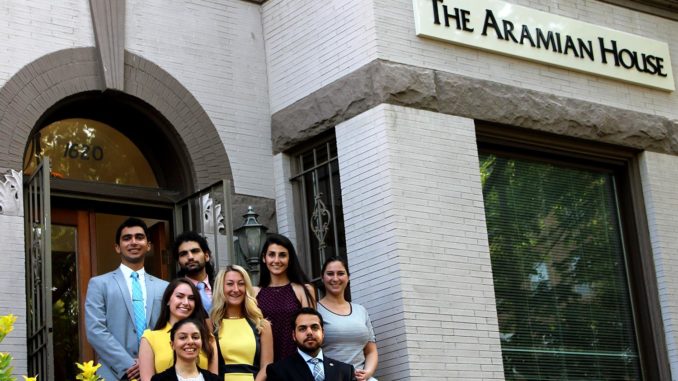
I couldn’t help feeling anxious as I packed my bags, preparing for eight weeks with complete strangers that I now call my ambitious, funny, and inspiringly passionate friends – the 2018 Leo Sarkisian Summer Interns. I had absolutely no idea what to expect. It was my first time in DC – in fact, it was my first time on the East coast!
But through all these new experiences, I somehow felt completely at home. The open arms of the unbelievably diligent staff of the ANCA was the first encounter that reminded me of the warmth of my loved ones in California.
But something that I hadn’t experienced so frequently before was being around peers that spoke the Armenian language. Back home, my closest friends are not Armenian and my community all speaks the same dialect, leaving little room for particular differences in language. This group was something pleasantly new – everyone bringing their own Armenian-American jargon to the table.
As one can imagine, as a group with origins ranging from Orange County, to Pasadena, to Boston, New Jersey, Indiana, and even Iran, we don’t all speak the same way. Not a day has gone by that our conversations don’t circle back to questions like, “How do you guys say ‘push the button’ in Eastern Armenian?” Maybe none of us know, and we’ll have to make a quick phone call to someone’s mother, but in the end, we all know a little more about the language and each other.
Although our linguistic abilities vary from seamless fluidity to a handful of words, we bond over the shared passion for improving each other’s vocabularies. With our day-to-day conversational “Armenglish,” in the office and at home, we not only practice speaking but also inadvertently help each other with our fluency.
After toying with phrases and more smoothly incorporating Armenian into our discourse, I reevaluated the role of our language in our identities and our work as ANCA interns. How important is it? This is a question that has been discussed in both my Ashod Yergat AYF chapter meetings back home, and also during Hamazkayin ArtLinks this year. It’s a common and recurring question, as we are part of a growing generation that must work to keep the language alive in a “foreign” environment that does not necessarily foster its survival.
Throughout many of the conversations I’ve had about preserving Armenian, I’ve heard mixed responses on the best way of approaching it. Responses have been partial to dialect, to embracing fluctuating lexicon or sticking with literary Armenian, as well as whether or not its preservation is integral to sustaining our culture. And looking back now, my fellow interns and I have touched on all these questions as a result of genuine interest and concern.
After much thought, we concluded that knowing Armenian may not be the most integral part of one’s identity – though it opens many avenues for connecting with the culture. After all, we all consider ourselves rich with Armenian heritage while having very different levels of literacy. That shared heritage is what brings us together, and our language only pulls us closer.
So, one of my favorite experiences as a Leo Sarkisian Intern has been this reconstructing of our Armenian backgrounds into a new, colloquial dialogue. In a way, we have invented our own dialect – reflective of the influences of English. Perhaps this evolution is how the language will be preserved within the young Armenian-American communities in the U.S. As long as the passion for sharing our ancestors’ tongue lives in us, I see a bright future for the generations to come.
Photo Caption: The ANCA Leo Sarkisian internship brings together young Armenian students with diverse backgrounds and communities across the U.S. – all of whom consider The Aramian House “home”.
This article was submitted to the Armenian Weekly by 2018 ANCA Leo Sarkisian Intern, Lucine Mikhanjian (UC Riverside, Class of 2018)



Be the first to comment